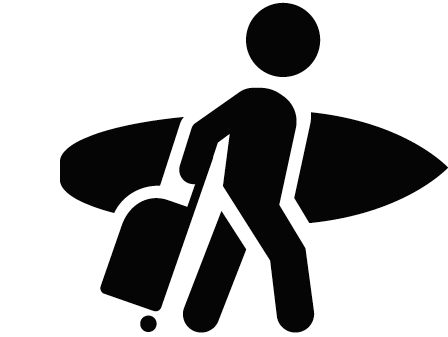Surfing in Venezuela

Venezuela is a country on the northern coast of South America that receives excellent waves during the North Atlantic swell season from November to March. The country has 2,800 km of a beautiful and diverse coastline that offer all kinds of reefs and beach breaks. Although the caribbean side can be a bit more inconsistent, the eastern region, near the capital Caracas, is probably the best choice to start exploring Venezuela. This stunning corner of the caribbean offers middle sized waves all year-round, within warm water and exotic scenery. The prevailing winds come from NE and the hurricane wind swells bring world class waves for the popular right point-breaks. Venezuela is slowly becoming a trendy surf destination. The country has been hosting lots of contests and epic surf videos of the best spots are starting to leak on the internet spreading the word about this beautiful and exciting country.
Climate in Venezuela
The climate in Venezuela is tropical with hot temperatures on the coastline all year round. There are two seasons in the country, there is a dry season from mid-December to mid-April and a rainy season from late April to mid-November. Venezuela is located just north of the Equator, so temperature range is usually limited, although during the dry season the prevailing NE trade winds make temperatures slightly cooler. The NE trade winds bring constant 3-6 ft short-period windswell from Nov to March. The mornings are usually the best time to surf before the wind picks up. During summer the prevailing winds turn more to east and swells are usually smaller ranging around 2-4 ft. Hurricane swells can produce epic 8-10ft conditions with low winds. Due to the proximity to the Equator there is a big tidal range in this area so always check the tides before going for a surf.
Best surf spots in Venezuela
The Venezuelan coast is still a well kept secret surfing treasure. The Eastern region, near Caracas, is the best choice to start to discover the best surf spots in Venezuela. Playa Pantaleta, Los Caracas, Punta Care, El Rio, Anare, Fido Point, Puerto Azul, Los Cocos, Tanaguarena and Mamo are a few surf spots around Caracas. The most famous surf spots in the western region are El Playon, Cuyagua and El Malecon. Parguito Beach is a popular surf spot on Margarita Island. Adicora Beach is located in Peninsula Paraguana and it’s known for being a great kitesurfing and windsurfing spot. The exotic archipelago of Los Roques is famous for excellent kitesurfing conditions as well
Budget Planning
Meal price range
Simple meals start at $1 USD. Mid-rang meals start at $3 USD. Dining & drinking at high-end restaurants can cost anywhere from $5 USD
Equipment rental
You should bring your own gear and don’t forget to bring spare gear too.
Prepaid SIM cards
Movistar is a good choice. SIM cards can be purchased from local shops. Prepaid packages start at $10 USD
Public transport
Buses are the most convenient and inexpensive way to get around.
Taxis are plentiful especially in Caracas, they are inexpensive but they do not use meters so agree on a price before you get in. Por puesto (shared taxis) are also common and follow set routes.
Caracas has a metro which is inexpensive and comfortable, with convenient links to long-distance bus stations.
It is not advisable to travel at night on public transportation.
Due to the economic situation there are very few rental cars available and their quality is generally terrible.
Gas prices
$0.01 USD a liter.
Types of risks
Reef breaks. Be alert of thieves, bad roads and boulders.
How to prepare
Visa
Citizens from 66 countries including, the EU, UK, and Australia, can enter Venezuela visa free for up to 90 days. Visitors are required to hold proof of sufficient funds to cover their stay and documents required for their next destination. Visitors not holding return/onward tickets could be refused entry.
All other nationalities must acquire a visa in advance.
Vaccines
Although it's not mandatory, it’s recommended that you have been vaccinated for hepatitis A & B, yellow fever, typhoid, rabies, meningitis, polio, Tdap, chickenpox, shingles, pneumonia, influenza, measles, mumps and rubella. You’ll be asked to show proof of your yellow fever vaccination if you come from a country with a risk of yellow fever.
Things to know
Language & Currency
Spanish is the official language.
The currency is the bolívar soberano (sovereign bolívar or BsS)
Once you get there use the black market to change money. Avoid ATMs or official exchange offices.
Best time to go
November to March
Checking Surf forecast
Checking the forecast about a week before your trip is always a good idea. Understanding what the waves will be like and knowing what gear to pack is essential. You can check the forecast for the waves here.
Do I need pack a pharmacy kit
You should bring a basic kit. Including ear drops, eye drops, bandaids, ear plugs, gaze, alcohol, mosquito repellent and broad spectrum antibiotic ointment.
Travel/Surf Insurance
World Nomads has great travel insurance packages that are not super expensive and they cover surfing.
Emergency
Dial 999
Check surf pictures of Venezuela at #surfvenezuela.

